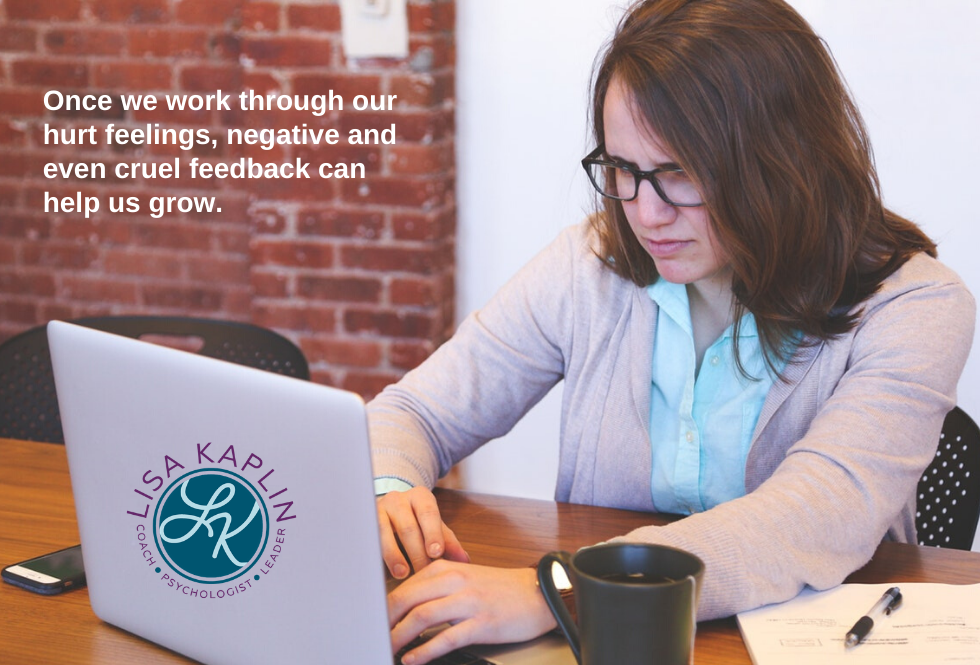As a corporate trainer and professional speaker, I am the lucky recipient of lots and lots of feedback. 95% of that feedback is really helpful, even when it’s negative or constructive. From student/client feedback, I’ve learned how to be aware of my physical presence in front of a room, professionalize my wardrobe, eliminate most filler words, talk slower, and try to avoid the Chicago based phrase, “you guys.” You can take the girl out of Chicago, but not necessarily Chicago out of the girl!
Feedback has led to so much growth in my career and in my life. As a lead trainer for iPEC Coaching, a large part of my learning process has been to get feedback from other lead trainers. Some of that feedback was a bit painful, but always given with kindness, respect, and a desire to help me learn. I’m grateful to those who have challenged me with very direct and constructive feedback that stung a bit, but led to my growth in so many areas.
But let’s talk about that other 5% of feedback that might not be as constructive and is probably the reason that many of us don’t love feedback. Over the last three years, I have received two pieces of feedback that have fallen into this category and, I must admit, threw me into a bit of a painful spiral. Both of these pieces of feedback would fall under the intentionally cruel category. They were direct hits at both my character and my capabilities.
One of them suggested that I wasn’t really a kind person. They felt I was unlikeable and mean. If you know me well, you know that one of my biggest buttons is around people being cruel. This particular feedback was like a knife to my gut. I read it and reread it with a lump in my throat and a pit in my stomach. The second piece of feedback suggested that although I’m an excellent coach, I’m really a dreadful trainer. I’d love to tell you that this didn’t hurt me, but it truly did. It brought up all those fears of not being good enough, being an imposter, etc.
Finding Value in Feedback that Hurts
In both cases, I sat for quite a while with my raging emotions. I varied from painful hurt to self-righteous anger. “How dare they say that about me!” I allowed myself the time to feel all the feels and be okay with them. The feedback was intended to hurt and it did. Yet, was there power for me, and maybe for those who wrote them, in learning from these reviews? Could I take something from these harsh feedbacks and utilize them to grow? Or should I just throw them out as outliers?
Once we work through our hurt feelings, negative and even cruel feedback can help us grow. #criticism #feedback #learning #growth Click To TweetThrowing them out as outliers was appealing, but maybe not as helpful as learning from the feedback. Although I am not a cruel person, maybe someone who is really struggling with their own learning and challenges could see me that way. Especially if I wasn’t being as empathic or as aware as I could be. I’ve used that feedback to be more patient with my students. I allow them to struggle without having to fix anything for them, but to still be there as they walked through their own journey. Interestingly enough, I’ve gotten feedback from students similar to this. “You were so kind to ______, who I found pretty annoying. You taught me something with your patience and willingness to listen to her complaints and interruptions. You modeled kindness that I wasn’t feeling.”
Certainly, I can always grow as both a coach and a trainer, but the feedback that I’m not a good trainer allowed me to think about being clear in my roles when I am leading a class. A coach is different from a trainer, and sometimes it might help me and the students if I was clearer when switching roles. That feedback has helped me to rethink some sections that I teach and the sections in which I model coaching. Ultimately, it was very helpful feedback.
There is power in all feedback, even the intentionally cruel feedback. If we allow ourselves to experience the reaction that this type of feedback can bring and then ask ourselves how we can utilize that feedback, we actually can grow because of it. Would the world be a better place if people were able to give feedback more kindly and more directly? Certainly so! Yet in the meantime, maybe it’s worth our time to find some nuggets in all messy feedback.
Love,

Lisa Kaplin Psy. D. PCC


This is a deeply helpful reminder! Thank you.